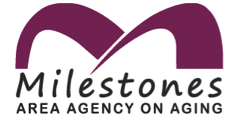July 1, 2024
How to Prevent, Detect and Report Financial Exploitation in ASSISTED LIVING FACILITIES

Contributed by NCEA – National Center on Elder Abuse
Financial exploitation is the fastest growing form of elder abuse. It is a crime and is often not reported. Learn how to protect yourself. The four steps below will help you prevent, detect and report financial exploitation.
1. KNOW Your Rights
There are no federal regulations for assisted living facilities (also known as board and care or residential care facilities), and requirements are different in each state. All states require facilities to protect residents from abuse, neglect and exploitation. For more information about your state’s assisted living regulations speak with the facility administrator or contact your local ombudsman program or call Milestones AAA at 855-410-6222.
2. PROTECT Your Financial Information
- If you need help managing your finances ask someone you trust to act as your agent (for a power of attorney), use a daily money manager or a representative payee for Social Security benefits.
- See an Elder Law attorney if you need legal help protecting your money (e.g. estate planning).
- Receive your benefits (e.g. pension checks) by direct deposit.
- Protect your personal information. Do not give out personal information like your Social Security or bank account numbers unless you contacted the person asking for that information.
- If you do not understand a document, seek help before signing.
- To reduce telemarketing calls, sign up on the National Do Not Call Registry (www.donotcall.gov or 1-888-382-1222).
- Tear up or shred financial documents (e.g. receipts, statements) before throwing them away.
3. REVIEW Your Financial Information
It is important to check your finances and benefits often and look for warning signs of financial exploitation. Some common warning signs include:
- The person helping you does not do what you ask with your money (e.g. purchase items for you, show you your bank statements, pay for your care and services).
- The facility gives you a discharge notice due to non-payment.
- You notice unfamiliar charges to your credit cards or receive statements for credit cards or accounts you did not open.
- A caregiver asks for, demands or takes money or gifts
4. REPORT Any Suspicion of Financial Abuse
Facilities are required to protect residents from and investigate reports of abuse. Financial exploitation is a crime. There is information available and agencies responsible for investigating reports of financial exploitation. If you suspect financial exploitation there are several things you can do:
- Share your concerns with the facility administrator, social worker or another staff person.
- Contact your state licensing and certification agency.
Each state has an agency responsible for the licensing, certification and regulation of long-term care facilities and investigations of complaints. To locate your state licensing and certification agency visit www.ltcombudsman.org/ombudsman. - Financial exploitation is a crime. Contact your local law enforcement agency.
Elder abuse is an intentional act or failure to act that causes or creates a risk of harm to an older adult. Common types of elder mistreatment include physical, sexual, emotional/ psychological, or financial abuse, neglect, or self-neglect. Elder abuse impacts people of all ages, identities, and backgrounds.
If you or someone you know is a victim of elder abuse, or if you suspect elder abuse, please call the Milestones Adult Rights Specialist at (855) 410-6222.
In cases of urgent danger, call 911 or the local police or sheriff.
Milestones Iowa Area Agency on Aging promotes a variety of Wellness Programs dedicated to building healthy lifestyles for older adults through education, counseling, and a variety of fitness and wellness classes to help keep you healthy and independent. Want to Learn More? Call Milestones at (855)-410-6222 or visit milestonesaaa.org.
Filed Under: Community, Finance, Health & Wellness, Retirement
Trackback URL: https://www.50pluslife.com/2024/07/01/how-to-prevent-detect-and-report-financial-exploitation-in-assisted-living-facilities/trackback/


